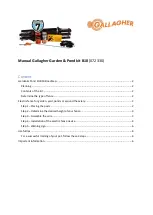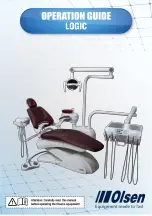
OM0295
Rev 2 September 2020
Page 35 of 103
6.2.4 Utilize Unidirectional Airflow
The operator must keep two important facts in mind: (1) The air as supplied to the work area through filters from
the top, is contaminant free and (2) Airborne contamination generated in the work area is controlled by the
unidirectional flow of parallel air streams in a top-to-bottom direction.
A solid object placed in a laminar air stream will disrupt the parallel flow and consequently, the capability of
controlling lateral movement of airborne particulates. A cone of turbulence extends below the object and
laminarity of the air stream is not regained until a point is reached downstream, approximately equal to three to
six times the diameter of the object. Within the parameters of this cone, particles may be carried laterally by
multidirectional eddy currents.
Transfer of viable materials and manipulations, which may generate aerosols, should not be performed above
sterile or uninoculated materials. Items should be localized on the work surface in "clean" and "dirty" groups.
6.2.5 Employ Aseptic Technique
The operator must not assume an attitude of "let the cabinet do it" when performing procedures within a LFBSC.
Properly balanced and properly used cabinets will do an excellent job of controlling airborne contamination and
containing viable agents, but the cabinet will not eliminate contact transmission of contamination. Normal
laboratory contamination control procedures and basic aseptic techniques are necessary to obtain maximum
benefit from the cabinet. For examples, open bottle, tube or flask mounts should be kept as parallel as possible to
the downflow to minimize capture of chance particulates. This precaution is merely an extension of good aseptic
technique as practiced on open bench tops. The good laboratory practices designed to minimize creation and/or
release of aerosols to the environment should not be discontinued.
Items of equipment in direct contact with the etiologic agent must remain in the cabinet until enclosed or until
surface-decontaminated. Trays of discard pipettes must be covered before removal from the cabinet (aluminum
foil may substitute for fabricated covers).
If an accident occurs which spills or splatters suspensions of etiologic agent around the work area, all surfaces and
items in the cabinet must be surface-decontaminated before being removed.
Applying a burner flame to flask and tube necks when mating surfaces of sterile assemblies is a conventional
method of minimizing chance contamination. However, the efficiency of this operation is usually related to the
removal of airborne contamination occurring while the item is uncovered. If the manipulation is carried out in an
environment free of airborne particulates, then the need for the flaming operation is essentially removed.
This is one of the additional advantages of the LFBSC - use of the gas burner is seldom necessary.
The gas burner flame in one of these cabinets not only contributes significantly to the heat build-up; it also
disrupts the laminar air streams, which must be maintained for maximum efficiency.
IF THE PROCEDURE
DEMANDS USE OF A FLAME, A BUNSEN BURNER WITH ON DEMAND IGNITION IS RECOMMENDED.
DO NOT USE
CONSTANT FLAME GAS BURNERS.
It should also be only used from the center of the work surface to the right rear
where resulting air turbulence will have a minimal effect.
DO NOT USE GAS BURNER ON THE LEFT OF THE WORK
SURFACE DUE TO ITS INFLUENCE ON THE ELECTRONIC AIRFLOW CONTROL SYSTEM.
If cabinet air is inadvertently
turned off, the flame could damage the HEPA filters.
Summary of Contents for LabGard NU-560-400
Page 7: ...OM0295 Rev 2 September 2020 Page 7 of 103...
Page 9: ...OM0295 Rev 2 September 2020 Page 9 of 103...
Page 10: ...OM0295 Rev 2 September 2020 Page 10 of 103...
Page 16: ...OM0295 Rev 2 September 2020 Page 16 of 103...
Page 17: ...OM0295 Rev 2 September 2020 Page 17 of 103...
Page 32: ...OM0295 Rev 2 September 2020 Page 32 of 103 Set New Password Retype New Password...
Page 43: ...OM0295 Rev 2 September 2020 Page 43 of 103...
Page 48: ...OM0295 Rev 2 September 2020 Page 48 of 103...
Page 80: ...OM0295 Rev 2 September 2020 Page 80 of 103...
Page 96: ...OM0295 Rev 2 September 2020 Page 96 of 103...
Page 97: ...OM0295 Rev 2 September 2020 Page 97 of 103...
Page 98: ...OM0295 Rev 2 September 2020 Page 98 of 103...
Page 99: ...OM0295 Rev 2 September 2020 Page 99 of 103...
Page 100: ...OM0295 Rev 2 September 2020 Page 100 of 103...
Page 101: ...OM0295 Rev 2 September 2020 Page 101 of 103...
















































